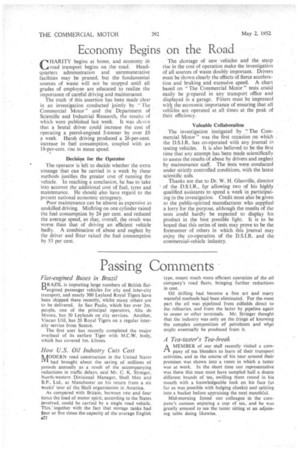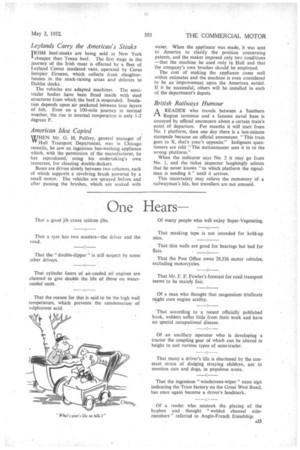Passing Comments
Page 24

Page 25

If you've noticed an error in this article please click here to report it so we can fix it.
Flat-engined Buses in Brazil
BRAZIL is importing large numbers of British flat
engined passenger vehicles for city and inter-city transport, and nearly 300 Leyland Royal Tigers have been shipped there recently, whilst many others are to be delivered. In Sao Paulo, which has over 2m. people, one of the principal operators. Alta de Mooca, has 30 Leylands on city services. Another, Viacao Util, has 20 Royal Tigers on a regular intercity service from Santos.
• The first user has recently completed the major overhaul of its earliest Tiger with M.C.W. body, which has covered lm. kiloms.
How U.S. Oil Industry 'Cuts Cost
MODERN road construction in the United States IVI had brought about the saving of millions of pounds annually as a result of the accompanying reductions in traffic delays, said Mr. C. K. Stringer, North-western Divisional Manager, Shell Mex and B.P., Ltd., at Manchester on his return from a six weeks' tour of the Shell organization in America.
As compared With Britain, between two and four times the load of motor spirit, according to the States involved, could be carried by a single road vehicle. This,' together with the fact that storage tanks had four or five times the,capacity of the average English A22
type, meant much more efficient operation of the oil company's road fleets, bringing further reductions in cost.
Oil drilling had, become a fine art and many wasteful methods had been eliminated. For the most part the oil was pipeline(' from oilfields direct to the refineries, and from the latter by pipeline again to ocean or other terminals. Mr. Stringer thought that the industry was only on the fringe of knowing the complex composition of petroleum and wh,at might eventually be produced from it.
A Tea-taster's Tea-break
A MEMBER of our staff recently visited a com
pany of tea blenders to learn of their transport activities, and in the course of his tour around their premises was shown into a room in which a taster was at work. In the short time our representative was there this man must have sampled half a dozen different brands of tea, swilling them round in his mouth with a knowledgeable look on his face (as far as was possible with bulging cheeks) and spitting into a bucket before appraising the next mouthful.
Mid-morning found our colleague in the company's canteen enjoying a cup of tea, and he was greatly amused to see the taster sitting at an adjoining table doing likewise.
Leylands Carry the American's Steaks
pia' beef-steaks are being sold in New York cheaper than Texan beef. The first stage in the journey of the Irish meat is effected by a fleet of Leyland Comet insulated vans, operated by Coras Iompair Eireann, which collects from slaughterhouses in the stock-raising areas and delivers to Dublin docks.
The vehicles are adapted machines. The semitrailer bodies have been fitted inside with steel structures from which the beef is suspended. Insulation depends upon air pocketed between four layers of felt. Even on a 100-mile journey in normal weather, the rise in internal temperature is only 1-2 degrees F.
American Idea Copied
WHEN Mr. G. H. Pulfrey, general manager of " Hull Transport Department, was in Chicago recently, he saw an ingenious bus-washing appliance which, with the permission of the manufacturer, he has reproduced, using his undertaking's own resources, for cleaning double-deckers.
Buses are driven slowly between two columns, each of which supports a revolving brush powered by a small motor. The vehicles are sprayed before and after passing the brushes, which are soaked with water. When the appliance was made, it was sent to America to clarify the position concerning patents, and the maker imposed only two conditions —that the machine be used only in Hull and that the company's own brushes should be employed.
The cost of making the appliance came well within estimates and the machine is even considered to be an 'improvement upon the American mOdel. If it be successful, others will be installed in each of the department's depots.
British Railways Humour
AREADER who travels between a Southern Region terminus and a famous naval base is annoyed by official unconcern about a certain train's point of departure. For months it will start from No. 1 platform, then one day there is a last-minute stampede because an official announces: "This train goes to X, that's your's opposite." Indignant questioners are told "The stationmaster sent it in to the wrong platform."
When the indicator says No. 2 it may go from No. 1, and the ticket inspector laughingly admits that he never knows "to which platform the signalman is sending it" until it arrives.
This uncertainty may relieve the monotony of a railwayman's life, but travellers are not amused.




















































































